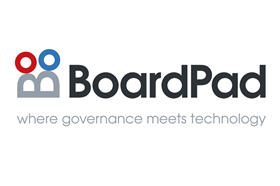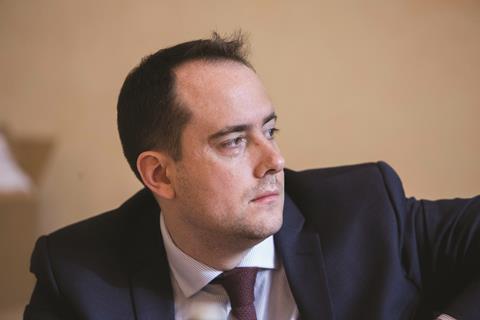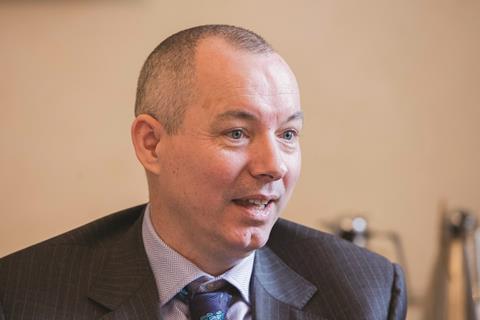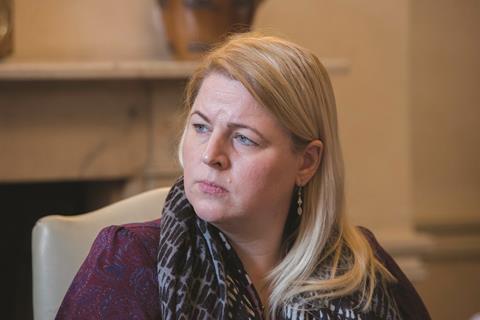Against the backdrop of digital guru Robert Wachter’s review, an HSJ roundtable examined the NHS’s progress towards a paperless future and the obstacles that remain in the way. By Claire Read
It is safe to assume Robert Wachter’s ears were burning throughout his February visit to the UK. The “digital doctor” – interim chair of the department of medicine at the University of California, San Francisco – was on this side of the Atlantic to begin his Jeremy Hunt-commissioned review of the NHS’s digital future.

A multitude of people are expressing a multitude of opinions on the recommendations Dr Wachter should include, and in early February many of them were gathered at an HSJ roundtable event on progress to paperless.
Supported by BoardPad, the roundtable united technology leaders from inside and outside the NHS. When HSJ’s James Illman asked them to name one item that should be included in the Wachter review, our technology correspondent – chair for this event – received a range of enthusiastic responses. Most were about overcoming what our panel saw as the barriers to the ambition for an NHS paperless at the point of care by 2020.
The biggest of those? Our panellists argued it was the NHS’s lack of confidence and expertise in technology.
Natalie Bateman – head of health, social care and government at techUK, the trade association for the technology industry – said if healthcare is to become paperless there is “a real need to support people within the NHS to become more informed customers”.
Roundtable participants
Natalie Bateman, head of health, social care and government, techUK
Ewan Davis, digital health strategist, Woodcote Consulting
Rachel Dunscombe, chief information officer, Salford Royal Foundation Trust
James Harley, business consultant, ICSA Boardroom Apps
James Illman, technology correspondent, HSJ (roundtable chair)
Zahid Latif, head of healthcare, Innovate UK
Paul Rice, head of technology strategy, NHS England
Confidence building
“We see from a supplier perspective that they don’t always have the right skillset, the knowledge base, the evidence to be able to make effective investment decisions around technology,” she said.
“And that has an impact on their willingness to see it as something that can be embedded into a system rather than a shiny, high cost, high risk bolt-on to what they do as their business as usual.
“They need to have their confidence built and supported to feel like they can make sensible decisions around technology.”
It was a point echoed by Rachel Dunscombe, chief information officer at Salford Royal Foundation Trust. She suggested there was a particular problem with boards’ risk appetite in this area, and hoped this would be addressed in the Wachter review.
In industry, we see boards that can make decisions based on quite abstract concepts. But I’m not sure NHS boards have ever been allowed or encouraged or mentored to do that
“If you look at chief executives and other board members, they’re purely focused on the here and now,” she said. “They don’t have the ability to flex the longer term vision. In some cases – other than private finance initiatives maybe or CT scanners or MRI scanners – they have never made major investments on this scale.
“In industry, we see boards that can make decisions based on quite abstract concepts. But I’m not sure NHS boards have ever been allowed or encouraged or mentored to do that.”
She described herself as fortunate to be at Salford, which is entirely paperless in the acute sphere – an achievement she attributes to strong board leadership and understanding. “Salford never had very much money but managed to make the journey because the leadership allowed it. Whereas neighbouring trusts didn’t, even though they had more money in some cases.”
The experiences of James Harley underscored the extent to which board appetite for technology varies. Mr Harley is a business consultant at ICSA Boardroom Apps, developers and suppliers of BoardPad – a meeting and document collaboration solution.
My concern in the wider context of a paperless NHS is people not making the move in the boardroom and then trying to implement paperless initiatives across the whole trust
BoardPad, which turns directors’ devices into digital board packs, is now in use at more than 110 NHS bodies. Yet Mr Harley reported that in many organisations there are issues with the board’s desire to eliminate hard copies from their meetings.
“Even at the big acute trusts in London, you still get a few board members who are reluctant to make the transition from paper. My concern in the wider context of a paperless NHS is people not making the move in the boardroom and then trying to implement paperless initiatives across the whole trust. The move needs to come from above.”
The issue of leadership was also picked up by Zahid Latif. Head of healthcare at government body Innovate UK – which provides funding for companies to develop new products and services – Mr Latif reported: “When we’re supporting companies developing the technologies, the market’s not ready yet. And it’s not been ready for many years.”
He added: “Where you see leadership within the NHS, that usually helps to drive the change, and you will see pockets of excellence emerging. How do you then make those connections to pockets of excellence?”
Paul Rice, head of technology strategy at NHS England, suggested such knowledge transfer would be a valuable area for the Wachter review to highlight. “Him picking out the fact that we need to do that knowledge transfer in a clear, coherent, sustainable way is really important,” said Mr Rice.
Global lessons
“There is some new stuff to be learnt, undoubtedly – this agenda moves at such a pace – but we’re also saying that systemically people know how to do this and what we’re not doing is moving that knowledge transfer forward at pace. We have people who know how healthcare digitisation is done: it’s encouraging the Salford experience is being captured from an NHS and a UK perspective and I think there are lessons that can be learned from across the globe.”
One key lesson, he suggested, is there will be issues post-implementation of a new technology. “Unless we as a system understand that there may be some hiccups and some issues, people are going to lose their nerve. And they shouldn’t lose their nerve because enough people should be able to say this is the natural process here.
”When you go through any change management programme – and I emphasise change management rather than technology deployment – you will have a dip. But it’s a hockey stick – it goes up the other side, as long as you listen and learn the lessons of others.”
Mr Rice also hoped the Wachter review would serve as an endorsement of the actions taken so far on healthcare digitisation. This includes the introduction of local digital roadmaps. All clinical commissioning groups are expected to develop such documents, outlining how they plan to “eradicate the use of paper in the treatment of patients across all health and care services… by 2020”, though the initial deadline of April 2016 has been pushed back to the summer – so as to better align with timeframes on sustainability and transformation plans, Mr Rice said.
“I think we’re on the right path in terms of people having a vehicle to draw out their priorities in this agenda, to be clear on their governance in this agenda, to join up their expectations and I’m hoping and trusting he [Wachter] will say that’s the right direction of travel.”
Asked by Mr Illman which behaviour NHS England is trying to drive with the roadmaps, Mr Rice pointed to better local conversations.
“They’re a vehicle by which people are having conversations I think they may not have previously had. That’s first and foremost. And there is a broad description of the ambition that people should be reaching towards – Personalised Health and Care 2020, or the paperfree at the point of care target within that.
“We will get a picture of a mixture of ambition from people, which is useful, to understand that. To a certain extent, it’s them revealing to themselves what’s actually going on. It’s local conversations we’re primarily trying to facilitate here, it’s not a conversation back to the centre primarily; it’s a vehicle for people to have those local conversations.”
Ms Dunscombe reported Greater Manchester has found roadmap creation helpful in just that way.
“I think it’s an incredibly positive thing; we’ve chosen to do it earlier than the NHS England deadlines as it’s forming some of the due diligence for devolution. It allows the people working on devolution to see what hand they’ve got – what they’re playing with, what they need to improve, what’s good.
“Getting that representation on paper of our [technology] journey has led to many discussions that have been really valuable, I think. So I welcome the roadmap; I think it should have happened a long time ago.”
Ewan Davis, a long time healthcare informatician currently working as an independent consultant, struck a rather more cautious tone on the benefits of roadmapping to progress on the paperless NHS.
’If I was being cynical, my next consultancy project would be how to game the digital maturity index’
“I think as with anything in the NHS, there’s good and bad, and extreme variation between the two. Of the 90 footprints, 52 are single CCGs and some of those just don’t make sense, particularly some of the South East London CCGs going alone. It’s not natural communities at that level. So I think there’s considerable variability.”
He also had worries about the role of the digital maturity index, a self-assessment of organisations’ digital abilities.
“If I was being cynical, my next consultancy project would be how to game the digital maturity index,” he said. “I have a concern about some of the ways people are approaching it.
“It is a good measure of digital maturity, but as soon as you make a metric a performance indicator it ceases to be a good metric. And I think there’s a danger in that. People who play it with a straight bat will find it really useful. But there’s lots of people out there who won’t play it with a straight bat.”
Leadership at top level
In response, Mr Rice suggested it was perhaps a matter of labelling. “What we asked people to undertake was a digital maturity self assessment. The step to index that in some way and show the relative position of people against others is a process that we will embark on as necessary. The digital maturity self assessment has exactly the same purpose as the local digital roadmap – an opportunity to reveal things about your true situation and plan collaboratively.
“In some respects it will relate to opportunities to secure investment, but it’s not a direct correlation. It isn’t: ‘We’ve clearly said about ourselves we’re deficient in x, y and z, I’ll just take my cap off and go to the comprehensive spending review settlement [which promised £1bn for healthcare digitisation].’ It was part of people having more intelligent and more informed conversations locally.”
’A lot of the really interesting ideas came from these rockstar scientists, or rockstar technologists – but they were hopeless at putting them into practice’
He was clear the process will uncover variation in digital capability and paperless progress. “Whether it’s board-level capability, whether it’s the calibre of people who can lead that transformation, whether it’s clinicians who are able to lead that agenda – we need to look and see that that capacity isn’t evenly spread across the country, that expertise isn’t in abundance, and therefore look to support some of those organisations that identify themselves as needing that support. And when I say ‘we’, I’m saying that collectively, with the emerging role of NHS Improvement as well.”
And what of leadership at the very top level? Tim Kelsey left his post as national director for patients and information late last year, and the search is on for a successor – though the role will now be chief information and technology officer. The panel agreed it was an important role in progressing the paperless agenda, and had clear views on the type of person who could most effectively deliver the leadership needed.
Mr Latif offered insight from his experience at Innovate UK. “We funded a number of ‘catapult’ centres to help turn really interesting early stage ideas into commercial practice,” he explained. “A lot of the really interesting ideas came from these rockstar scientists, or rockstar technologists – but they were hopeless at putting them into practice.
“Therefore, it’s not necessarily about having rockstars – what you need is people who understand dull but important elements of making sure you get these things done. For me, it’s what reduces this to practice and makes it scalable and useable rather than saying: ‘Wow, look at this cool technology’.”
Mr Davis agreed. “I think there’s rockstar issue, and let’s look at Kids Company to see what happens when you get rockstars.
“And I think the other issue is the skills that we need. I don’t think at that level they’re the skills of a chief technology officer or chief information officer. I think they’re much closer to the skills of a chief clinical information officer.”
Mr Rice proffered a pun when asked what would be needed in the person who, he pointed out with a laugh, would be his boss. “I think we’re looking for rock climbers rather than rock stars,” he said.
The point received firm agreement from the panel. If paperless by 2020 is to become a reality, Mr Kelsey’s successor and Dr Wachter may wish to bring rock picks rather than guitar picks.
Glass half full or half empty? Our panel’s optimism about the nhs being paperless at the point of care by 2020
Jeremy Hunt first announced the ambition for a paperless NHS in January 2013. The deadline at that stage was 2018, but it was revised slightly by Personalised Health and Care 2020. Published late last year by the National Information Board, the document states clinicians in primary, urgent and emergency care will be operating without the use of paper records by 2018, with all care records digital at the point of care by 2020. How optimistic are our panel that the 2020 goal will be reached?
“I think we’re on the right road. I think it was right to extend from 2018 to 2020 and right to define and make it clear that it’s not a completely paperless NHS. You see the rhetoric now changing to paperless at the point of care, which I think is really important, and I think it’s right to not assume the NHS in the round will be completely digital. I think we’re certainly making the right steps towards getting there; we certainly see a lot of ambition set out by the National Information Board in Personalised Health and Care 2020. But will we be there by 2020? No.”
Natalie Bateman, head of health, social care and government, techUK
“Do I think it can be achieved? Well, no. Do I think we’re making progress towards it? Yes. I think there are some critical things we have to do about open standards, about engagement with clinicians, it’s about building the capability of the workforce around that, it’s about user-centred design, and I’m delighted to see some of those seeds coming out strongly in some of the stuff I’ve seen ahead of Bob Wachter’s review.
“And it’s about leadership – I don’t think we’ve had leaders of NHS IT who are in a position to critically appraise the options that are open to them. I think we need a different style of leadership there. And if we can address those, we will make progress.”
Ewan Davis, digital health strategist, Woodcote Consulting
“No it won’t happen. It will happen in some places, but no it will not happen in all. I think from my perspective, it’s about data standards as well as interoperability standards.
“It’s about our ability to supply and manage, and it’s about the fact the NHS has not been the intelligent client, and so some of the issues have been that we’re not able to interface with the suppliers.”
Rachel Dunscombe, chief information officer, Salford Royal Foundation Trust
“I take a great deal of confidence from the survey in the 27 January 2016 edition of Health Service Journal, where 50 per cent of your sample said ‘yes, I think it is well within the NHS’s reach’ or ‘yes, but I think it will be challenging’. I think my answer is it will be challenging.
“I’m very encouraged by the progress that’s currently being made – there’s no one saying it’s the wrong thing to do, it’s the wrong direction of travel. There is as ever with these things a huge amount of devil in the detail.
“It has to be board level and senior leadership on this agenda, there has to be an NHS that’s an intelligent customer, there has to be – reflecting the mood around the world – an openness about systems, a use of standards.
“Actually digitising individual institutions, I think we could do that reasonably rapidly – I think EHR [electronic health record] products are sufficiently mature that there are individual organisations already showing how to excel in deploying those solutions. But those solutions aren’t sufficient for the new models of care that we need to see to better serve our population.
“So we need to break that information out of those systems and we need to ensure that system leaders understand the criticality of that, and [we need to] use every lever and incentive at our disposal to achieve that.”
Paul Rice, head of technology strategy, NHS England

































No comments yet